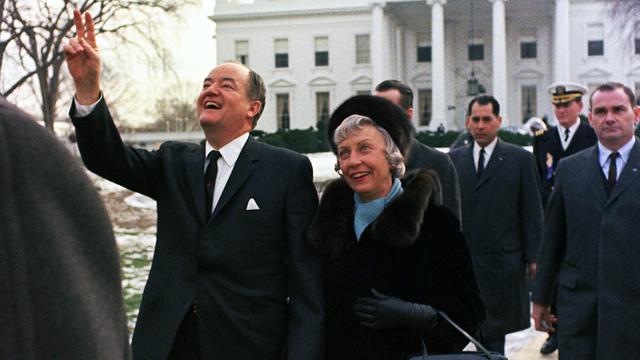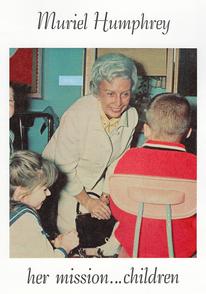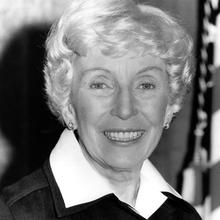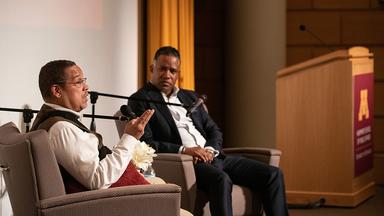Muriel Humphrey grew up a shy girl in South Dakota, becoming a confident political partner and advisor to her husband, Hubert H. Humphrey, before filling his seat in the U.S. Senate after his death in 1978.
Born February 20, 1912 in Huron, South Dakota, Muriel Buck met Hubert Humphrey in 1933 while she was attending Huron College and he was working at his father’s drugstore in town.
The Humphrey shop was a popular meeting place for college students, and Muriel met him on one of her visits. They frequently went out dancing together, and Muriel said “it was love at first waltz.”
The two were married in 1936. The following year, they moved to Minneapolis where Hubert enrolled in the University of Minnesota and she worked as a typist.
After brief stints in Louisiana and Duluth, they returned to Minneapolis; Hubert Humphrey was elected mayor of Minneapolis in 1945, and successfully ran for U.S. Senate three years later.
Teaming up
Muriel Humphrey played an indirect part in her husband’s early political career, keeping a certain distance between her role as mother to four children and Hubert’s public life, but also assisting him as an informal advisor.
She recalled their talks in the kitchen: “I’d say something while taking care of my babies and later it would be part of his speech.”
It was not until Hubert’s first Senate re-election campaign in 1954 that Muriel began playing a more active role in his political career.
Muriel logged more than 650,000 miles on campaign trips and official visits during her husband's time as U.S. senator, vice president, and presidential candidate.
“I enjoy campaigning so much I think I should have my head examined,” she said in a 1960 interview. “Hubert and I both get a lift out of meeting people.”
When President Lyndon Johnson chose Hubert Humphrey as his 1964 running mate, the Wall Street Journal described Muriel Humphrey as one of her husband’s key advisors. She campaigned seven days a week for her husband during his unsuccessful campaign for the Democratic nomination for president in 1972; Muriel was one of the first political wives to campaign alone extensively.
Becoming a senator
After a long and grueling battle with cancer, Hubert Humphrey died in January 1978, leaving his U.S. Senate seat vacant. Minnesota Gov. Rudy Perpich appointed Muriel to serve in the office until a special election in November of that year.
In accepting the appointment, Muriel said, “I believe I can help complete some of the very important legislative business that Hubert hoped to finish.” She was sworn in less than a month after her husband died, as Minnesota's first female U.S. senator and only the 12th woman to serve in the Senate.
Muriel's first speech in the Senate urged ratification of the treaties turning over control of the Panama Canal to Panama and guaranteeing the canal’s neutrality, positions that her husband had supported.
The issue was so important to Muriel that she even missed a family vacation in Wyoming because of it, her son, Hubert "Skip" Humphrey III, recalled. “We waited and waited but she never made it. She was sleeping on a cot in the halls of Congress, waiting to vote on the Panama Canal treaty.” The Senate approved the treaty, with one vote to spare.
As a member of the Foreign Relations and Governmental Affairs Committees, Muriel supported President Jimmy Carter's efforts to sell military aircraft to Egypt, Israel and Saudi Arabia, and she voted to extend job security protections to federal whistleblowers.
During her 10 months in the Senate, Muriel also publicly favored liberal issues including abortion rights, an extension of the Equal Rights Amendment (ERA) ratification deadline, prenatal healthcare, and programs to benefit people with developmental disabilities. Her interest in the latter was spurred by the birth of a granddaughter with Down syndrome.
Years later, Muriel responded to President George H.W. Bush’s criticism of liberalism. “There’s something I’ve been wanting to say for a long time. I’m a liberal, and I’m proud of it. In fact, I was probably a little more liberal than Hubert was.”
Returning to private life
Muriel decided not to seek election in 1978 for the remaining four years of her late husband’s Senate term, saying she wanted to return to Minnesota and “resume life as a private person, with ample time for my home, family and friends.”
But even as she pondered that decision, Muriel said it was important to have more women serve in the Senate. At the time, she was the only one. She left office when her term expired on November 7, 1978.
In 1981, Muriel married Max Brown, a childhood friend, and she enjoyed her life out of the spotlight.
"I don't live a life of politics any more,” she said in a 1986 interview with the Star Tribune. “Max and I have so much fun. We have a wonderful companionship that Hubert and I didn't have, couldn't have. We were so busy and it was so official almost all the time."
Muriel Humphrey Brown died September 20, 1998, at her home in suburban Minneapolis. She was 86. She is interred in Lakewood Cemetery in Minneapolis, next to her first husband, Hubert Humphrey.
“Half of what we credit Hubert for we should credit Muriel [for], because they were a team from beginning to end,” said Walter Mondale after her death. “Together, they helped change this country to a better, fairer, more decent society.”
At her funeral, Skip Humphrey gave the closing eulogy, alluding to his mother’s skillful sewing and needlepoint as he described her life as “the tapestry of a noble and beautiful human being.”




